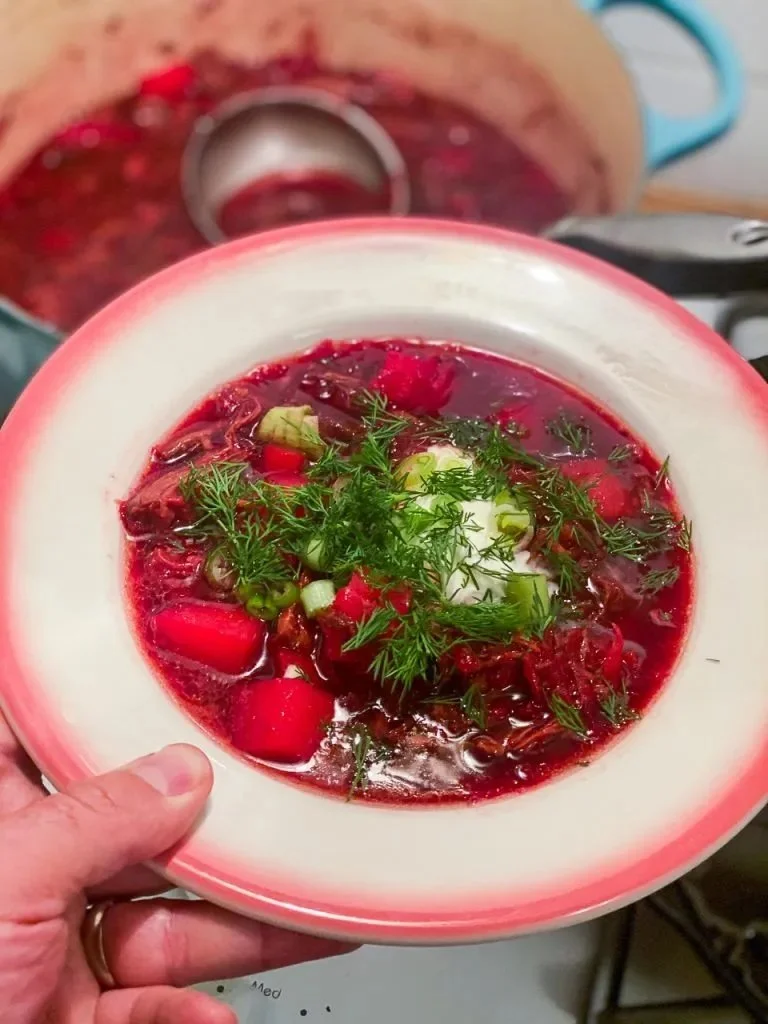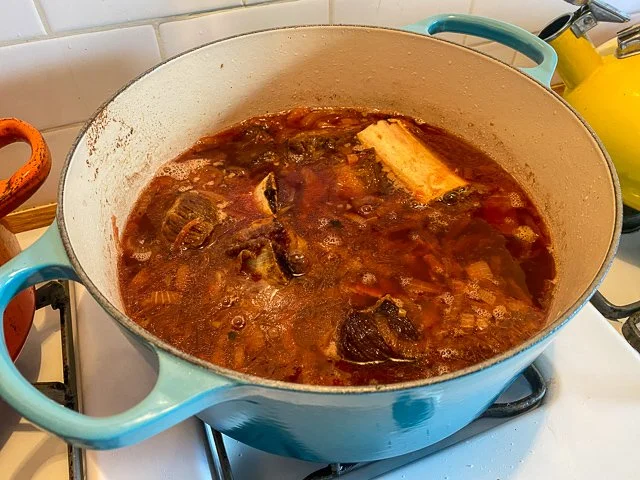There Will Be Borscht
Recently I interviewed Dorie Greenspan on my Instagram Live and she talked about how she's been cooking so much lately from cookbooks. I confessed that I'd fallen into a rut where I just keep making the same things over and over again: roast chicken with root vegetables, pasta, pork chops, pasta, soup, pasta. Did I mention pasta?
She urged me to take more chances on recipes that I'd never made before and when we finished I looked at all of the cookbooks in my collection that I hadn't been using. If you know me at all, you'll know that I'm guilty of buying cookbooks on a whim (see: the piles of cookbooks everywhere in our apartment) and the first one that caught my eye was the Kachka cookbook, winner of the 2018 Piglet tournament of cookbooks. I've had Kachka for two years and never cooked from it. I flipped it open and immediately landed on the recipe I knew I had to make: short rib borsch.
My ancestors are all Russian Jews (well, except for my mother's mother's father's parents, who were from western Europe) and so borscht is somewhere in my blood, perhaps literally. It's something that I've always enjoyed, most notably at Veselka in New York, but I've never attempted to make it myself.
Helping me along on this journey was the fact that my parents got me the most thoughtful gift for Hanukkah: a 7-quart Le Creuset Carribbean-colored pot, featured above. I was eager to break it in and what better way to break it in than to sear some short ribs in hot oil?
That's hot this borscht recipe starts: you sear short ribs and that's how you build flavor. You use onions to work up the brown bits and then add beets to the pot.
You cover with beef broth, which you simmer for an hour until the broth is flavored with beets and the beets are partially cooked through. Then you remove the beets, put the short ribs back in, and cook for several hours more (about four in my case) until the short ribs are fall-apart tender.
I love a pot like that on the stove: I bet a similar pot was on the stove in a shtetl a century ago in one of my great, great-grandparents' kitchens.
Did I mention that making borscht is incredibly easy? There's a lot of passive time where you just let things simmer. At this point, you remove the short ribs, let them cool, then shred the meat. Then in goes a potato.
And shredded beets, plus a shredded carrot.
Once the potato's cooked through, you add the meat back in, and that's that: you've got borscht.
The best part, though, is topping it. Traditionally you top it with smetana, which the Kachka cookbook says is creamier than American sour cream and that you can make it yourself with buttermilk and cream, but I just used the American stuff. You also add scallions, dill, and most interestingly the book instructs to add some spicy mustard directly into the soup. "To me, it's not borsch without this finishing touch."
This dinner was an enormous hit. It was cozy but also surprising; ancestral while also, somehow, modern. And the colors!
Thank you, Dorie Greenspan, for inspiring me to crack open a cookbook and to try something new. Next up: OXTAILS. More on that next week.
Short Rib Borscht
A braised beef stew with beets adapted from the Kachka cookbook.
1/4 cup Canonla oil
2 1/2 to 3 pounds bone-in beef short ribs
Kosher salt
2 medium yellow onions, halved and sliced into half moons
3 large red beets, scrubbed thoroughly (I used a clean sponge under cold water to really get the dirt off, since the beets go into the soup unpeeled.)
2 quarts beef stock
2 large Yukon gold potatoes, peeled and cut into 3/4-inch dice
1 carrot, peeled and grated on the large holes of a box grater
1/2 cup smetana or European-style sour cream
1 handful thinly sliced scallions
1 handful coarsely chopped fresh dill
Grainy mustard (for serving)
Start by browning the short ribs. In a large stock pot, over high heat, add the oil. While the pot is heating, season the short ribs all over with salt (be generous). Add the short ribs, a few at a time, and brown to a nice dark sear (a few minutes per side), using tongs to flip. The brown bits at the bottom of the pot give you all the flavor; monitor the heat so they don't burn. Set the browned short ribs aside and discard the excess grease from the pot.
Reduce the heat to medium and add the onions, plus a pinch of salt. Cook, stirring occasionally, until they're deeply caramelized, about 30 minutes. (Keep an eye on it so the onions don't burn.) Add the beets and the stock.
Bring to a boil, reduce to a simmer. Keep simmering until the beets are about half cooked -- a knife will go in with some resistance -- about 1 hour. (You're flavoring the stock with beets in this step.)
Carefully remove the beets with the ladle and add the short ribs back to the pot, cooking at the gentlest simmer, for 3 to 4 hours, uncovered, until the short ribs are fall-apart tender. Taste about halfway to see if it needs more salt. (Mine was super salty, so I added some water.)
Peel away the skin of the cooled beets, then grate them on the largest holes of a box grater.
When the short ribs have fully cooked, remove them to a bowl. Add the potatoes to the pot, simmer until they're cooked through (about 10 minutes). While the potatoes cook, pull the short rib meat off the bones, removing any connective tissue. Discard the bones and chop the meat into bite-size chunks. Stir the meat back into the pot, along with the grated beets and carrots. Simmer a few minutes more until the beets are cooked through.
Ladle the borscht into bowls and garnish with a dollop of smetana or sour cream, a sprinkling of scallions and dill. Serve with spicy mustard.








